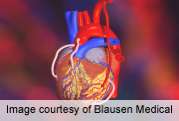(HealthDay)—The rate of major adverse cardiovascular events is higher in patients with diabetes mellitus (DM) and multivessel coronary artery disease treated with insulin (ITDM) versus those not treated with insulin (non-ITDM), according to a study published in the Sept. 23 issue of the Journal of the American College of Cardiology.
George D. Dangas, M.D., Ph.D., from the Icahn School of Medicine at Mount Sinai in New York City, and colleagues compared percutaneous coronary intervention (PCI) versus coronary artery bypass graft surgery (CABG) in 1,850 participants who had an index revascularization procedure performed (956 underwent PCI with drug-eluting stents [DES] and 894 underwent CABG). Nearly one-third of patients (32.5 percent) had ITDM (PCI/DES, 325 patients; CABG, 277 patients).
The researchers found that the overall five-year event rate of death/stroke/myocardial infarction (MI) was significantly higher in ITDM versus non-ITDM patients (28.7 versus 19.5 percent; P < 0.001). This difference remained even after adjustment for baseline factors, including angiographic complexity and revascularization treatment group (death/stroke/MI composite hazard ratio [HR], 1.35; 95 percent confidence interval [CI], 1.06 to 1.73; P = 0.014). For the composite end point, CABG was superior to PCI/DES in both DM types, with a similar magnitude of treatment effect (P = 0.40) for ITDM (PCI versus CABG HR, 1.21; 95 percent CI, 0.87 to 1.69) and non-ITDM patients (PCI versus CABG HR, 1.46; 95 percent CI, 1.10 to 1.94).
"We did not detect a significant difference in the magnitude of PCI versus CABG treatment effect for patients treated with insulin and those not treated with insulin," conclude the authors.
More information:
Full Text (subscription or payment may be required)
Editorial (subscription or payment may be required)
Journal information: Journal of the American College of Cardiology
Copyright © 2014 HealthDay. All rights reserved.




















